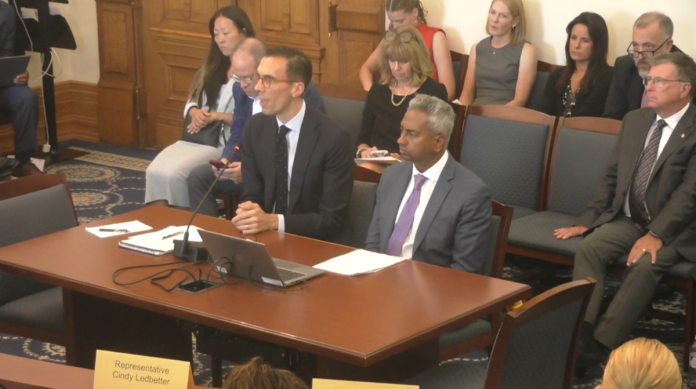Lawmakers discuss the future of an illegal drug as a “breakthrough therapy†for Hoosiers
- By Kyra Howard, TheStatehouseFile.com
- Sep 16, 2023 Updated Sep 13, 2023
With veterans and first responders in mind, lawmakers are studying the use of psychedelic drugs such as psilocybin for people whose other interventions for mental health conditions have failed.
Ben Unger, left, and Dr. Ranji Varghese testified to share their experience in researching psilocybin as a mental health treatment. Varghese is an investigator in the first FDA-approved psilocybin research trial at the University of Minnesota.
Screenshot by Kyra Howard, TheStatehouseFile.com.
The Interim Study Committee on Public Health, Behavioral Health and Human Services met Wednesday afternoon at the Indiana Statehouse to hear testimony from doctors, psychiatrists and others.
Earlier this year, the U.S. Food and Drug Administration deemed the use of psychedelic drugs as potential treatmentsfor medical conditions as “breakthrough therapies.†According to its site, this designation speeds up the development and review of these drugs.
The study committee heard three hours of testimony to aid in consideration of what legislation to introduce next session, if any.
Dr. Diane Reis, medical director of Mental Health America of Indiana, gave an overview of conditions like PTSD, depression, and anxiety, noting the higher rates for veterans and first responders. She discussed treatments, including the use of psychedelics such as psilocybin. She added that she was not there to ask for a certain course of action but to help lawmakers understand clinical terms and treatments for different mental health issues.
The committee discussion mainly focused on psilocybin as a treatment. Research has indicated it can promote plasticity in the brain, according to the National Institute of Health, which can help people with resistant conditions like depression. Psilocybin, commonly known as magic mushrooms or shrooms, is naturally occurring and consumed for its hallucinogenic effects, according to the Alcohol and Drug Foundation.
Research and clinical trials are ongoing, but expert testimony seemed to encourage lawmakers to be proactive.
Ben Unger, director of psilocybin policy for New Approach, thanked Indiana lawmakers for tackling mental health and the sometimes seemingly controversial issues surrounding it.
“The hope and promise is real,†said Unger. “The science is real in a way that ought to help us rethink how we think about these substances. People need leadership from you all to figure out how to use these substances in a safe and responsible manner. And we think proactive policy is the best way to accomplish that.â€
Lawmakers raised some concerns over legalizing psilocybin as a treatment, asking about the cost, the potential negative impacts of drug use such as addiction, and the possible lasting hallucination effects.
Brock Patterson, director of government affairs for the Indiana Prosecuting Attorneys Council, echoed some of these concerns, also noting cases of individuals blaming psychedelic drugs for committing violent crimes.
“It is pretty disingenuous to try to tie those two things [crime and psychedelics] together,†said Rep. Justin Moed D-Indianapolis. He added there are laws in place to prosecute individuals when prescription drugs are misused.
Patternson stated that the attorneys council’s recommendation is that if lawmakers move forward, they should do so with a clinical research approach through Purdue or Indiana universities.
Testimony emphasized that these are therapeutic treatments supervised by trained individuals, not at-home or recreational use of psychedelics. Physicians would vet patients carefully for qualifying factors such as previous failed treatments, current mindstates and support systems.
The committee’s final meeting will take place Oct. 18, when it will make a final report with recommendations.
FOOTNOTE: Â Kyra Howard is a reporter for TheStatehouseFile.com, a news website powered by Franklin College journalism students.
Â





